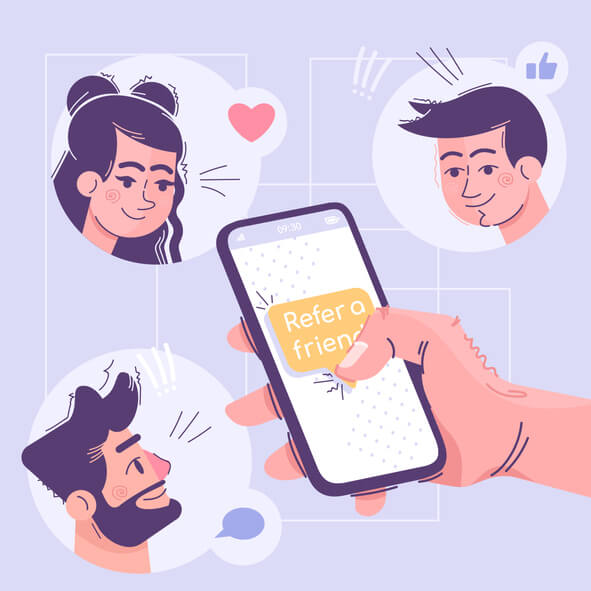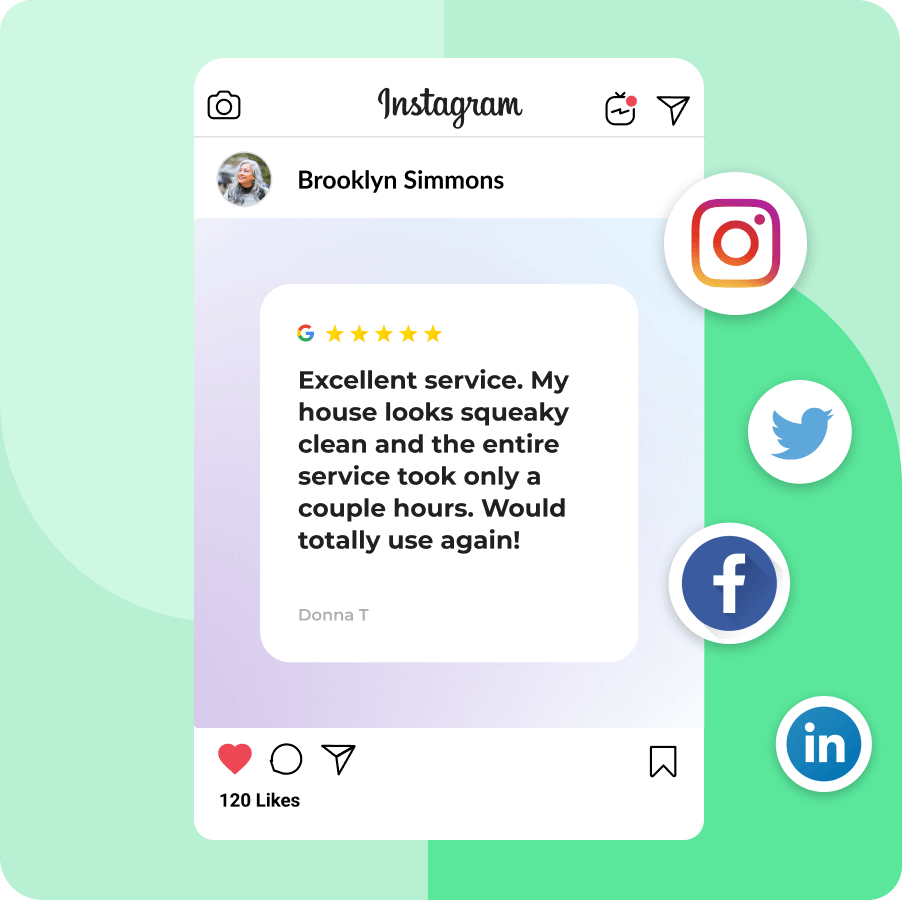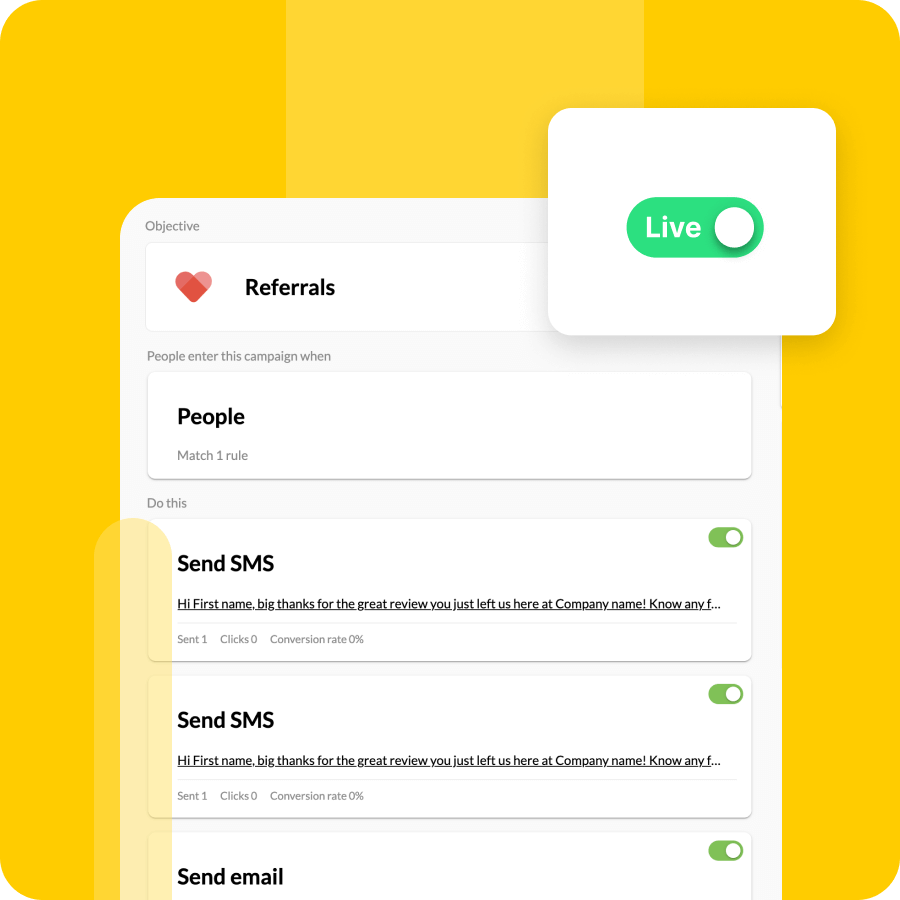Word-of-Mouth Marketing: How to Build a Winning Strategy and 6 Benefits
If you are a business owner or a marketer looking for an impactful way to spread the word about your brand, look no further than word-of-mouth marketing!
Word-of-mouth marketing, typically abbreviated to WOMM, is all about harnessing the power of personal recommendations to actively promote your products or services. It's the oldest form of advertising and one of the most effective.
Think about it: when you're looking for a new restaurant or comparing products, who do you turn to for advice? Your friends, family, or colleagues, right?
Their opinions matter because you trust them. And when they recommend something, you're more likely to try it out. Research shows that 88% of consumers trust recommendations from people they know more than any other ad channel.
That's the beauty of word-of-mouth marketing! It's not a message from a faceless company, but a personal recommendation from someone you know and trust. And that makes all the difference!
The only question is, how do you tap into the power of word-of-mouth marketing for your business or brand? That's what we'll explore in this article.
From creating buzz-worthy offerings to incentivizing satisfied customers to share their experiences, we have the tools you need to make WOMM work for your business.
So buckle up and get ready to unleash the power of personal recommendations!
What is word-of-mouth marketing?

Word-of-mouth marketing is a powerful form of promotion that relies on personal recommendations from friends, family, and even strangers to spread the word about a company, brand, product, or service.
It’s a kind of marketing that can be both organic and strategic, helping to build brand awareness and generate new business.
Put simply, it is the process of getting people talking by encouraging spontaneous conversations about a brand or its products.
Word-of-mouth marketing involves people talking to other people about their experiences with a particular brand.
Whether through social media, in-person conversations, or online reviews, these personal recommendations carry a lot of weight.
Studies have shown that people are much more likely to trust the opinions of their friends and family than they are to trust traditional advertising.
In fact, BrightLocal found that 76% of consumers read online reviews regularly while searching for local businesses. It goes to show just how much consumers trust feedback left by others.
The best part about word-of-mouth marketing? It’s a relatively low-cost way to reach large audiences.
When someone is excited about a particular product or service, they are eager to share their positive experience with others. This organic sharing of information can be a great marketing tool for your brand.
Of course, there are ways to amplify and encourage word-of-mouth marketing.
You can incentivize your customers to leave reviews or share their experiences on social media. Some ways to incentivize customers might include offering gift cards or a discount coupon on their next visit.
Before we delve into developing word-of-mouth strategies, let’s first understand why it’s such an important tool for every marketer to have in their arsenal.
Why is word-of-mouth marketing important?
The greatest appeal of word-of-mouth marketing is that it’s seen as more authentic than deliberate advertising. When people recommend a product or service, they do so because they genuinely believe in it. That makes it a vital component of a business's marketing strategy.
We’ve gathered a few compelling statistics to shed light on the crucial role word-of-mouth recommendations plays in building a brand’s reputation and taking its success to the next level.
Word-of-mouth marketing statistics:
-
Word-of-mouth is responsible for $6 trillion in annual global spending and 13% of all sales.
-
28% of customers prefer to find out about a new brand, product, or service through word-of-mouth.
-
Word-of-mouth has a higher research-to-purchase ratio than social media, digital advertising, and print ads.
-
Word-of-mouth publicity generates five times the sales of paid ads.
-
A survey by ActiveCampaign revealed that 42% of customers find out about Black-owned businesses by word-of-mouth.
6 Benefits of word-of-mouth marketing

Now that we’ve established its bona fides, let’s find out the specific benefits you can expect from word-of-mouth advertising:
Build trust
When people hear about your business from someone they know, they are likelier to act on that recommendation. Word-of-mouth marketing builds trust and credibility in a way that traditional advertising cannot. That’s because referrals come organically from close friends, colleagues, family, and previous customers.
Low-cost
Unlike standard advertising, a word-of-mouth marketing campaign can reach audiences at a much lower cost. When people share their experiences with others, they are marketing for you. This leads to a high return on investment and a greater impact on your business.
Increase brand awareness
When people talk positively about your business, they introduce potential customers to your brand, products, and services. Such spontaneous word-of-mouth marketing can help increase brand awareness and generate buzz, leading to new customers and increased sales.
Build customer loyalty
WOMM strategies prioritize customer experience and allow customers to connect deeply with the brand. Loyal customers who feel they are part of a community are more likely to become advocates for your business. Word-of-mouth marketing helps foster this sense of community and build stronger relationships with your customers.
Provide valuable feedback
When customers share their experiences with others, they are also providing valuable feedback that can help you improve your offerings and business model. Word-of-mouth marketing can be a great way to learn what customers like and don't like about your products or services. Online reviews, for example, are excellent tools for brands to collect customer feedback and make improvements to their businesses.
Enhance SEO
Online reviews, content marketing, and social proof mentions help improve your search engine optimization (SEO). Search engines like Google and Bing prioritize businesses with honest reviews and rank them higher on the results page. That helps people connect with your brand easily while searching for it online.
What are some word-of-mouth marketing strategies?

Developing custom word-of-mouth marketing strategy can effectively promote your business, build brand awareness, and generate new sales. Here’s how you go about developing successful word-of-mouth marketing tactics:
1. Identify your target audience
The first step in any marketing strategy is to identify your target audience.
Who are the people you want to reach? What are their interests, values, and behaviors?
Based on factors such as these as well as demographics like age, gender, income, and education, you can build buyer personas (fictional representations of your ideal customer) about who your word-of-mouth marketing strategy might resonate with.
2. Create great products or services
The best way to generate word-of-mouth buzz is to create products or services that people are excited about. This can be anything from a new product launch to an innovative service offering.
Coming up with an offering that clearly differentiates you from your competitors can help create positive vibes and anticipation around your brand.
Whatever it is, make sure what you’re offering is something that people will want to talk about and share with others.
3. Encourage reviews
Positive reviews and testimonials can be powerful tools for generating word-of-mouth publicity. Encourage your customers to leave reviews on your website or social media platforms.
Ask satisfied customers to provide testimonials that you can display prominently on your web page or in marketing materials. Leveraging user-generated content is a fantastic way to save time and money because your happy customers are the ones providing fresh marketing assets!
Start getting 4x more reviews increase your online reputation!
NiceJob's reputation marketing platform takes word-of-mouth marketing to the next level.
Learn more
4. Leverage social media
Social media sites are an effective platform for word-of-mouth marketing.
Encourage user-generated content by asking your followers to share their experiences with your brand and to recommend your products or services to others.
You can create social media campaigns to persuade people to share your message with their followers. Responding promptly to customer queries, comments, and feedback can be easier to handle on social media.
Here's how you can actually turn your best reviews into awesome social media content with NiceJob Stories!
5. Offer incentives
Incentivizing your customers to share their experiences with others can be highly effective for generating word-of-mouth buzz.
The incentive can be anything from a discount on their next purchase, a free gift, or a referral marketing deal. Discounts on referrals can be particularly effective in creating a successful WOM campaign.
Referral marketing can encourage customers to recommend your brand to others and help with customer acquisition. A formal referral program can also enhance customer loyalty.
Or better yet, don't offer them and surprise and delight them instead with an unexpected gift to thank them for choosing your business!
6. Partner with influencers
Influencer marketing is all the rage these days, especially in generating organic word-of-mouth advertising.
Identify relevant influencers in your industry with large followings and strong connections with your target audience. Work with them to create user-generated content that promotes your brand and encourages their followers to check out your products or services.
Influencers can be turned into useful ambassadors for your business who advocate for your products to their large audiences.
7. Monitor and respond to feedback
Finally, treat all feedback with the utmost urgency. Make sure to never censor negative comments.
Instead, respond to negative reviews. It sounds counterintuitive, but doing this can help you earn trust and credibility with both existing and potential customers. All this goes to help your brand build a community of customers while boosting your online reputation.
3 Amazing word-of-mouth marketing examples
Here are some memorable word-of-mouth marketing examples to inspire small businesses to develop WOMM strategies of their own.
1. Spotify
Spotify has become one of the most popular music streaming services in the world, thanks in large part to its effective word-of-mouth marketing strategy. A key component of Spotify's marketing approach is its focus on personalized recommendations.
The company analyzes user data and preferences to deliver customized playlist suggestions. Providing users with highly personalized listening experiences has enabled Spotify to generate positive word-of-mouth buzz and build significant brand loyalty.
Spotify has also been successful in engaging with its audience on social media. Its year-end recap, known as ‘Spotify Wrapped’, is particularly popular with users.
The strategy allows users to share their music via social media posts and stories on platforms like Twitter and Instagram, sparking conversations with potential customers.
In this way, Spotify has been able to engage in viral marketing to attract new users by creating engaging and shareable user generated content.
2. Netflix
Netflix has become a household name around the world largely due to its successful organic word-of-mouth strategy.
A key reason for Netflix's successful word-of-mouth promotion is its focus on delivering high-quality content. The streaming giant has invested heavily in creating original content, including hit shows like Stranger Things and The Crown.
By consistently delivering entertaining programming, Netflix has been able to build a passionate fan base that is eager to share their love for the service with others.
Netflix also has a highly original and creative social media marketing strategy that embraces user-generated content and fosters a sense of community.
By delivering great content and engaging with its audience, Netflix has established itself as a leader in the entertainment industry and a model for effective marketing.
3. Dropbox
Dropbox is a cloud-based file storage service known for its effective word-of-mouth marketing campaign, particularly its referral program. It rewards users with additional storage space for inviting their friends and family members to sign up for the service.
The referral program has been a key component of Dropbox's word-of-mouth marketing success.
By offering a tangible reward for referrals, the company has been able to incentivize existing customers to spread the word about its service. Word-of-mouth marketing has helped Dropbox build a loyal customer base and attract new users at a low cost.
Boost your word-of-mouth marketing easyily and effectively
If you're looking to amp up your word-of-mouth marketing strategy, NiceJob is the perfect tool. Our advanced review generation and reputation marketing features lets NiceJob turn your happy customers into brand advocates.
With NiceJob, you can automate review requests and collect valuable feedback from your customers. The platform also makes it easy to showcase positive reviews on your website and social media channels, giving you the social proof you need to attract new customers.
Easily put your customer referral program on autopilot.
Let us take care of those time-consuming tasks so you can spend more time focusing on your customers.
See how it works



